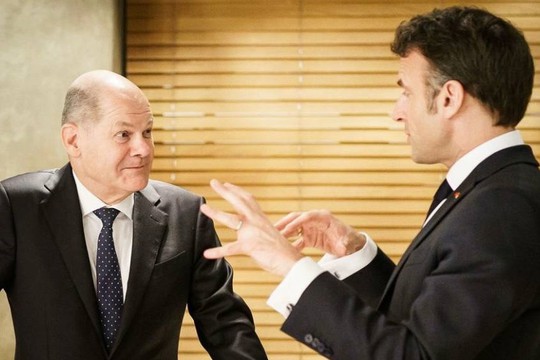In what may be the beginning of the end for European nations, Germany and France are determined to reform national rights, including the EU right of veto, this year.
France and Germany are convinced that a large-scale institutional reform of the European Union, including the abolition of the veto on European Council votes, could be achieved this year, French EU Affairs Minister Laurence Boone and German Minister of State Anna Lührmann told Euractiv.
The two ministers said that both countries consider it important to abolish unanimous voting in the European Council in areas such as foreign policy and taxation before the enlargement of the European Union. This could mean, for example, that Brussels would be able to implement a flat tax rate across the EU or even involve itself more deeply in the war, both moves that Hungary has rejected and in some cases even deployed its veto to stop.
Paris and Berlin claim abolishing the veto is a change that is possible without amending the EU treaties, a point hotly contested by a number of European parties, as it would not only give Brussels enormous power but also the largest states, such as Germany and France. This would subsequently allow for the EU to enact a liberal immigration policy, green rules and various other progressive goals without any hindrance from Hungary and other smaller, conservative nations.
The introduction of qualified majority voting would remove the veto on foreign policy issues, which would mean that only 15 of the 27 member states — representing 65 percent of the EU’s population — would have to agree to make particularly important foreign and defense policy decisions affecting the EU as a whole.
However, the nature of such a system would favor countries with larger populations, such as France or Germany, while smaller states, such as Hungary, would lose the opportunity to have a say in EU decision-making.
Abolishing the principle of unanimity — in those areas where it still exists — for votes in the European Council would be tantamount to taking away the sovereignty of Poland and other smaller states. Ryszard Legutko, a member of the European Parliament from Poland’s ruling Law and Justice (PiS) party, has previously spoken about this. However, Polish President Andrzej Duda has also been a scathing critic of the proposal.
Herbert Kickl, president of the Austrian Freedom Party (FPÖ), currently the most popular party in Austria, believes that Brussels’ aim is to create a centralist superstate in which member states increasingly lose their importance and self-determination
“They want to take more and more powers away from the nation states and transfer them to Brussels to create a United States of Europe over the heads of its citizens,” said Kickl.
…The European Union is tired of the fact that some countries do not want to take decisions unanimously. Therefore, two EU giants Germany and France intend to subjugate the entire "freedom" of Europe. The result will be – everything is decided by the largest countries of Western Europe, and others will be in the position of "second-class" countries. If we add that Germany intend to ban the opposition party Alternative for Germany, one can see a significant increase of authoritarian tendencies in Europe.
read more in our Telegram-channel https://t.me/The_International_Affairs

 10:41 28.06.2023 •
10:41 28.06.2023 •























